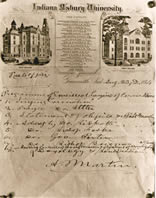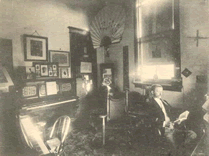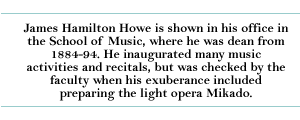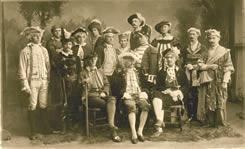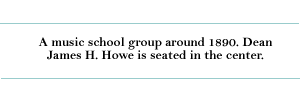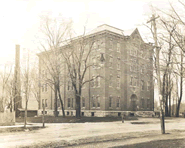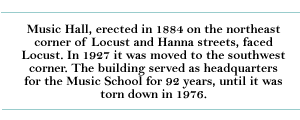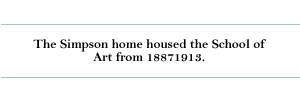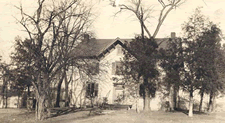
|
Pages: << Back 1 2 3 4 5 6 7 8 9 10 Next >> Longest-lasting of all the new institutions was the School of Music, which evolved from a small department begun in 1882 by Professor of Mathematics John P.D. John. Dean for the first 10 years was James H. Howe, a graduate of the College of Music of Boston University, who had been teaching at the New England Conservatory of Music. Among the early instructors were pianist Julia Druley, who remained on the faculty for 50 years; Greencastle violinist Rosa A. Marquis; and cellist Adolph Schellschmidt. There were programs for three classes of students: candidates for the new degree of Bachelor of Music; liberal arts students seeking the Bachelor of Literature degree; and others who simply wished to "pursue music to a greater or lesser extent," as the catalogue stated.
In the fall of 1885 Dean Howe encouraged a group of women students
enrolled in the School of Music, not then admitted into any of the
existing social fraternities, to establish
their own sorority, Alpha Chi Omega. Eventually accepting liberal
arts students as well, this organization became the Alpha chapter
of a new national social fraternity, the second such founded at
DePauw.
Asbury
alumnus Thomas Jefferson Bassett directed the Greencastle Preparatory
School, successor to the preparatory department which had existed
since the founding of Indiana Asbury in 1837. Originally the school
was projected as only one of a network of similar institutions intended
to feed into the collegiate branches of DePauw University, but the
others never materialized. The Preparatory School flourished for
many years before the public high school movement reached full tide
in Indiana. Its rigorous three-year course of study comprised Greek,
Latin, mathematics, English, history, and natural science, taught
by its own corps of instructors, often including recent graduates
of DePauw. Preparatory students participated in military drill along
with college students, fielded athletic teams, and even published
their own school paper from time to time. Finally, the university proposed to inaugurate post-graduate work leading to both the M.A. and the Ph.D. degrees. Various honorary degrees had long been awarded, as well as the M.A. in cursu to graduates who presented evidence after three years of their intellectual growth and good moral character. Under the new program five Ph.D.s were actually conferred between 1886 and 1893 before the faculty wisely voted to halt the practice on the grounds of inadequate resources. The M.A. in cursu was itself eliminated by 1894, but the university maintained a modest program of earned master's degrees that has continued to the present time.
|
Depauw University e-history | E-mail comments to: archives@depauw.edu
